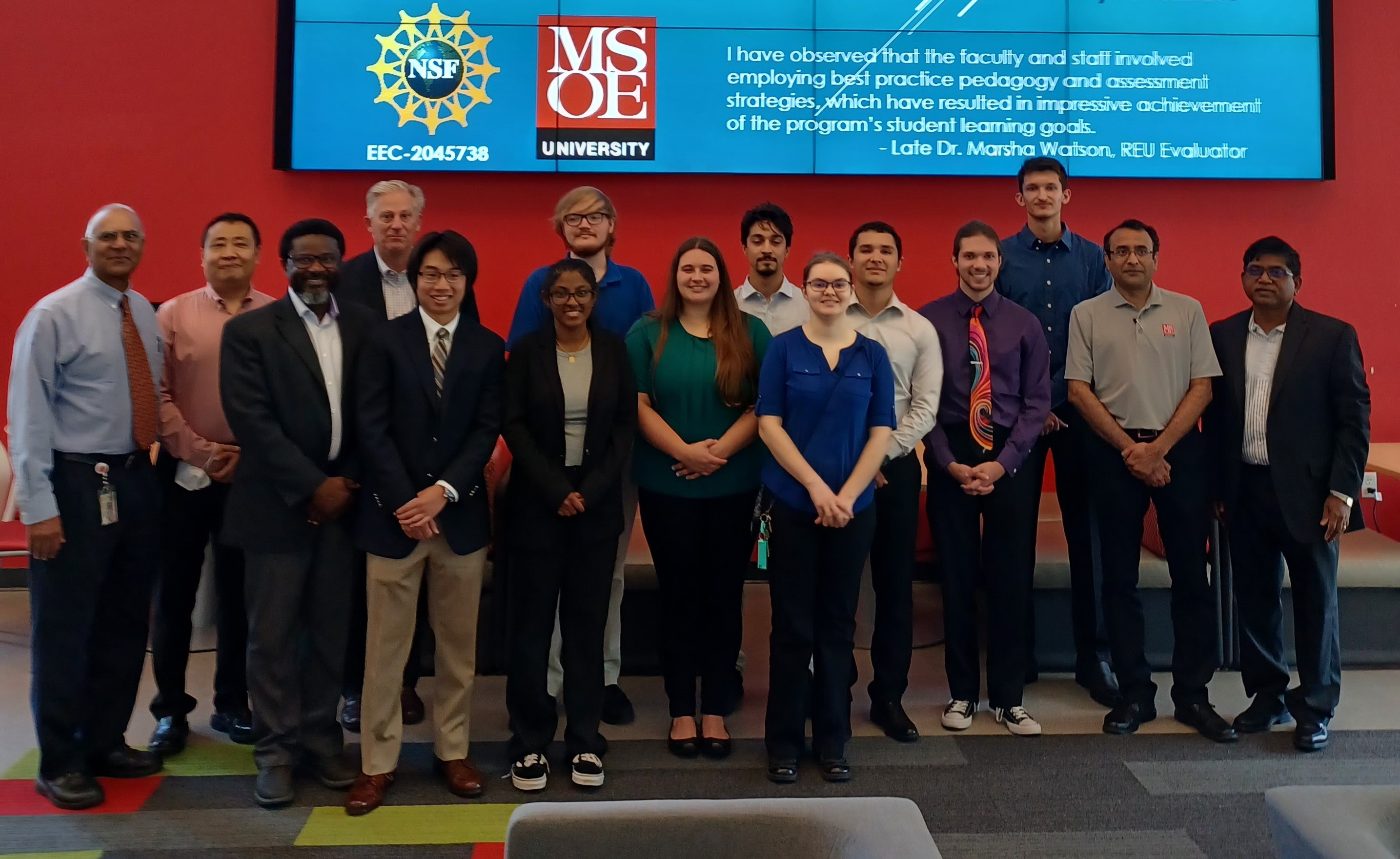Research Experience for Undergraduates
 A broad mix of undergraduate students will participate in innovative research projects focused on space systems technology research in mechanical engineering. These projects will explore cutting-edge areas, including space mechanism design theory and its applications, design of self-healing additively manufactured materials for space component repair, design and simulation of hyperlastic materials for spacecraft sealing, simulations of space vehicles in low-gravity environments, and more. All research projects aim to advance societal well-being, improve U.S. economic competitiveness, and/or foster environmental sustainability.
A broad mix of undergraduate students will participate in innovative research projects focused on space systems technology research in mechanical engineering. These projects will explore cutting-edge areas, including space mechanism design theory and its applications, design of self-healing additively manufactured materials for space component repair, design and simulation of hyperlastic materials for spacecraft sealing, simulations of space vehicles in low-gravity environments, and more. All research projects aim to advance societal well-being, improve U.S. economic competitiveness, and/or foster environmental sustainability.
Students will have access to a strongly mentored research environment where each student is mentored by an MSOE mechanical engineering faculty member. Students will explore MSOE’s state-of-the-art research facilities such as the Rapid Prototyping Center (RPC) and Rosie Supercomputer located in the Dwight and Dian Diercks Computational Science Hall. The REU team hopes that the diverse cohort - from primarily undergraduate institutions - will get to present at the National Conference on Undergraduate Research or the American Institute for Aeronautics and Astronautics Regional Conference.

Important Dates
- Program Dates: June 1st to August 8th, 2025 (Tentative)
- Application Deadline: Not Currently Accepting Applications (Pending NSF Support)
Early application is highly encouraged.
Who Should Apply?
Students who have completed their sophomore year of a mechanical engineering or pre-engineering curriculum; are enrolled in a university for the fall term; are a full-time student with a cumulative GPA of 3.00 or greater; are a U.S. Citizen, U.S. National or permanent resident of the United States; have an interest in research and in learning about Space Systems Technology will be considered. Women, minorities and persons with disabilities are especially encouraged to apply. Accepted candidates will participate 40 hours per week for the 10-week session. All students receive an attractive stipend ($700 per week) and a travel allowance. Housing is also provided.
How to Apply
Student Qualifications in General
- Completed the sophomore year of a mechanical engineering or pre-engineering program.
- Enrolled in a college or university for the fall term as a full-time student.
- Earned a GPA of 3.00 or greater.
- Must be a U.S. citizen, U.S. National or permanent resident of the United States.
- Have an interest in research and in learning about the REU Site topics.
- Women, minorities and persons with disabilities are especially encouraged to apply.
- No experience in Space Systems Technology research is required.
Required Application Materials
- One-page resume
- One-page statement indicating your interest in Space Systems Technology and undergraduate research.
- One-page statement about why you should be selected as a participant.
- One letter of reference (preferably from a previous or current faculty member)
- Your university transcript (include transcripts from each university you have attended): unofficial transcripts are acceptable for applying.
Application materials must be received by the specified due date (Currently Pending NSF Support). They should be sent via email as one PDF package. Reference letters can also be e-mailed directly to the PI. Only complete applications will be reviewed.
Submit Your Application
Send your application materials by email to:
Dr. Brian Slaboch
Milwaukee School of Engineering
1025 N. Broadway
Milwaukee WI 53202
Questions? Contact Dr. Slaboch.
REU 2023 Photos




REU 2022 Photos



Historical REU Projects
REU 2023 Oral Research Presentations →
2023 REU Projects
- Lap Shear Testing of Solvent-Welded Additively Manufactured Materials
- Studies on Diclofenac and its Metabolism
- Green Synthesis of Gold-Palladium Nanoparticles Using Upland Cress: Synthesis and Characterization
- Synthesis and Testing of a Nanobead Sunscreen from Kaempferia galanga rhizomes, a Green Chemistry Approach
- Isostatic Pressure Testing of Fused Deposition Modeling Materials
- Design of Pectin-based Microspheres for Targeted Pulmonary Drug Delivery
- Investigation on the Effect of Photo-dose Parameters on Mechanical Properties of Photopolymer Resin
- Challenges in Post-Processing of Fused-Deposition Modeled Parts
- Leveraging Machine Learning in the Design of Novel Ionic Liquids

REU 2022 Oral Research Presentations →
2022 REU Projects
- Ethyl Cinnamate Nanobead Sunscreen Characterization Using Mouse Skin NIH/3T3 Fibroblast Cells
- Green Synthesis of Metallic Nanoparticles using American Ginseng and Upland Cress
- Investigation of Blister Formation in Post-Processing of Additively Manufactured Parts
- Diclofenac Cytotoxicity in 2- and 3-D Rat Hepatocytes
- Biomedical Applications of Pectin Microspheres
- A Realistic Brain Phantom for Advanced Neuroimaging Quality Assurance
- Medical Applications of Additive Manufacturing: Anatomical Modeling
- Material Development – Attaining New Properties with Filled Polymers
- Methods of Creating Fiber-based Brain Phantom for Diffusion Tensor MRI
REU 2021 Oral Research Presentations →
2021 REU Projects
- Manufacture of a Head Phantom for MRI Machine Calibration
- Creation of Three-dimensional Pedagogical Models of Genetic Mutations
- Biosynthesis of Gold Nanoparticles Using Upland Cress: Process Optimization and Characterization
- Synthesis of a Nano-bead Sunscreen and Testing its Efficacy
- Creation of Three-dimensional Pedagogical Models of Genetic Mutations
- Development of Pectin Microspheres as a Novel Component of Bioink
- Characterization of Additively Manufactured Metals from ADDere Printing
- Additive-Subtractive Hybrid Manufacturing Machine (ASHMM) Software Toolchain
- Additive-Subtractive Hybrid Manufacturing
REU 2021 Photos

REU 2021 participants

Executive VP of Academics, Dr. Baumgartner, conversing with Efrem Dana at the Poster Presentation.

Andrew Gray of Trinity University wins the Marsha Watson Excellence in Communication Award.
